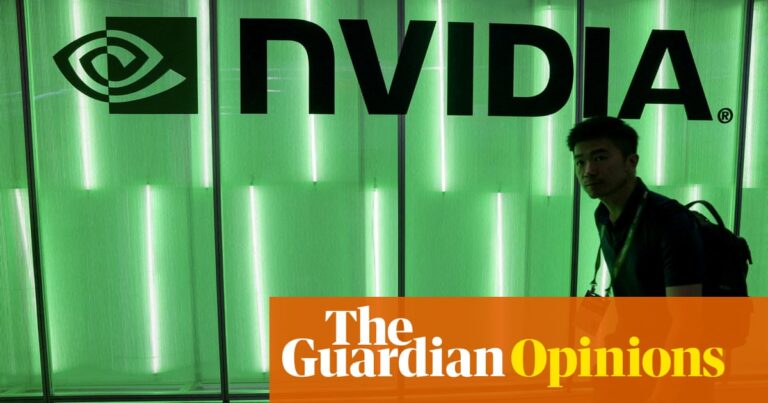circleWhen a company triples in value in a matter of months, as computer chip maker Nvidia has, investors take notice. But regulators also take notice, because they know from experience how monopolies can engage in illegal anticompetitive behavior to crush rivals and manipulate markets to extend their dominance. The U.S. Department of Justice (and other competition authorities and tech watchdogs) suspect Nvidia of using such tactics to solidify its chip monopoly, and last month it was reported that the Department of Justice is opening an antitrust investigation. The time to investigate is now.
Before the pandemic, few people had heard of the company outside of video game enthusiasts who owned top-of-the-line gaming computers and consoles equipped with powerful Nvidia chips. But thanks to the generative AI boom, Nvidia has become one of the fastest-growing companies in history, and its chips have powered every major AI milestone, including OpenAI’s development of ChatGPT, which now accounts for two-thirds of the market for AI business tools.
The massive calculations that power generative AI require tens or even hundreds of thousands of incredibly powerful chips in huge data centers — the kind of calculations that Nvidia’s graphics processing units (GPUs) excel at — have helped the company’s market capitalization soar more than 30-fold in just five years, briefly surpassing Microsoft and Apple to become the world’s most valuable company earlier this summer.
This is all great for Nvidia investors riding the AI wave, but recent stock market volatility suggests the enthusiasm may be overblown. Nvidia shouldn’t be blamed for making the most of being in the right place at the right time, but how a company like Nvidia grows matters. When companies use unfair practices to drive out competitors, jack up prices, and deepen moats around their monopolies, that’s bad for customers, bad for fair competition, and bad for the general public.
Like other tech giants, Nvidia is hell-bent on dominating every market it enters. The company sells 88% of the world’s GPUs and dominates AI, which some predict will be a trillion-dollar market within a few years. Some analysts estimate that Nvidia already controls 98% of the data center GPU market.
But like other big tech companies, NVIDIA has risen to the top, albeit with less oversight, by using its market power to lock in customers and marginalize competitors. The company bundles everything its customers need (chips, software, network services) into a package and prohibits those companies from doing business with competitors. Similar tactics like bundling, tying, and self-preferencing have already led to ongoing and unresolved antitrust cases in multiple jurisdictions against Amazon, Apple, Google, and others, and NVIDIA may be next. The company is already under antitrust investigation in France, the European Union, and the UK.
Controlling a limited supply of high-demand chips, Nvidia has become the gatekeeper of progress. The company decides whose AI development gets pushed forward (mainly the tech giants) and who gets starved (smaller competitors). Large contracts with companies like Meta, which buy tens or hundreds of thousands of chips at a time, sideline independent entrepreneurs and researchers who can’t compete. And even when it comes to serving smaller customers, Nvidia gives preferential treatment to the companies in which it has a stake.
Healthy competition for AI chips benefits everyone. Equitable access to advanced semiconductors helps ensure that the potential benefits of AI are shared widely, not limited to an elite few. It gives small, agile companies a fair chance, ensuring that AI innovation is not done on the terms of big tech companies. It also increases choice for companies, lowers costs, and makes products and services more affordable for consumers. And reducing reliance on a single, all-powerful producer makes us more resilient to supply chain disruptions and technological failures, such as the COVID-19 pandemic and the recent Crowdstrike/Microsoft IT outage.
There’s another reason to be wary of the chip market’s extreme concentration: As AI regulations are slowly being introduced, whether through EU AI laws or White House executive orders on AI, Nvidia is taking on a quasi-regulatory role, deciding who gets chips and for what purpose. This isn’t how it should be: regulatory policy is a public function, and commercial companies shouldn’t be allowed to use their sheer size to fill the void. But Nvidia wants it that way, and it’s lobbying hard to maintain its de facto global AI dominance.
Nvidia’s dramatic rise has taken many by surprise. But while the company may be the “new kid” among big tech companies, it does not exempt it from regulators for abusing its monopoly power. By locking in customers and squeezing out competitors, Nvidia is rigging the AI market to increase its own profits and undermine the public interest. Competition authorities around the world have been too slow to stop today’s tech giants from dominating Web 2.0; we cannot afford to repeat the same mistakes with Nvidia and AI.

